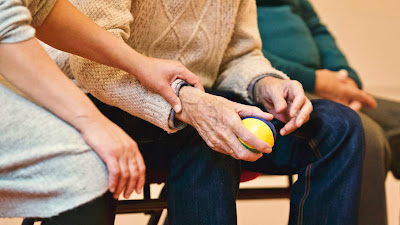While it is mainly associated with older adults, a stroke can happen to anyone at any time. As the fifth leading cause of death and the leading cause of adult disability, experience a stroke not only affect’s the person who suffers from one but also their close friends and family. While the severity of a stroke differs from person to person, the road to recovery is difficult. If you have a loved one who has suffered from a stroke, it can be jarring to see them in a different state than you’re used to. To help, Visiting Angels Punta Gorda provides some insight on what you can do to support a loved one recover from a stroke.
Active Listening Can Go a Long Way
When one suffers a stroke, brain cells begin to die due to a lack of blood flow that contains nutrients and oxygen. Of those who survive a stroke more than likely will experience a loss in their cognitive and physical abilities. A typical symptom of a stroke is paralysis and trouble understanding speech.When you visit them as they go through physical therapy and speech therapy, simply lending your ear and giving them your full attention can go a long way. By putting aside all other distractions, you reassure your loved one that you understand how difficult it is for them and that you will be there to figure things out together.
Be Their Advocate When No One Else Can
On the road to recovery, it’s possible your loved one may need to be in a health care setting 24/7 upon being discharged from the hospital. While the facility they may stay in is designed to help them rehabilitate, it can be unsettling to be alone in an unfamiliar space.You can be their advocate by visiting frequently and ensuring they are comfortable. Because your loved one may have trouble speaking, communicating their preferences to the staff can be difficult. When you visit, you can tell the care staff your loved one’s preferences. Let them know what foods your loved one prefers and what television shows they would rather watch. These small gestures can help them feel more comfortable while you are away. At a difficult time in their life, it’s important to ensure that they can at least enjoy the small things.
Be Their Source of Encouragement
The road to recovery after a stroke is difficult. While your loved one will receive support from their therapy team, it would mean a whole lot more to receive encouragement from you. If you can, attend their therapy sessions so you can witness their progress firsthand and so you can be the first person to praise their hard work. Afterwards, you can spend time together by going outside or by playing their favorite game. You can even coordinate close friends and family to put together care packages and notes of encouragement. By reminding your loved one they have a source of encouragement, it can help tremendously in the long run.Find a Support Group
While it is important to be there for your loved one, it is equally important to find the support you need as well. Having a loved one who is recovering from a stroke is not only hard for them, but it is also hard for you. Find a support group that you can join. It can be reassuring to have a group of people who are going through a similar situation as you. As they also have a loved one who has suffered a stroke, it can be liberating to express your feelings of sadness, frustration, and even guilt to a group of individuals who understand you.If you or a loved one has suffered a stroke, Visiting Angels Punta Gorda is there for you. Their caregivers can help with daily tasks at home that may be too demanding for your loved one. By providing the assistance they need, your loved one will have the comfort they need while you are way. If you are in the Punta Gorda area and are looking for home care for a loved one, contact Visiting Angels Punta Gorda today.
